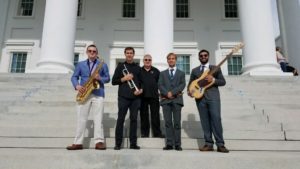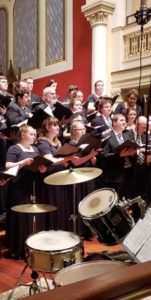Music is universal.

It is a significant element in every culture. But it’s not all the same. There are lots of musics in the world. And understanding each other means exploring each other’s cultures. Sharing music–like sharing food–is hospitality. Making music together connects us in ways nothing else can.
If you are reading this, music matters to you.
But why study it in college?
There are a lot of different ways to study music: performance, composition, theory, history, education, technology, ethnomusicology. Music majors try all of these. But you don’t have to major or minor to study it at UMW. You can concentrate on whatever interests you most. For example:
- Hone your singing or instrumental skills in private lessons and ensemble rehearsals with outstanding faculty
- Perform for the university community–or on tour regionally or internationally
- Learn audio recording and production techniques
- Train your brain in music theory courses to perceive what your ears hear and to imagine what might be possible
- Compose your own music: a UMW student won a national composition prize recently
- Learn the sitar or mridangam, in the Indian Music Ensemble, or jazz improvisation, or bagpipes and drums for the Eagle Pipe Band
- Consider the historical narratives that continue to shape our perceptions of the music we love (or love to hate)

There has been a lot of research into the benefits of music study for children–language acquisition, fine motor skills, developing self-discipline and cooperative skills, improved concentration–all skills that is helpful to have in college, regardless of your major. Students who study music tend to do better taking tests in any discipline–maybe because they become accustomed to performing under pressure? We notice, too, that the student leaders on campus tend to be involved in the music programs here. They make time for it because it is worth their time.

MATT TOVAR
UMW ’19
George Washington University School of Medicine
As the only Biochemistry major in my diatonic music theory class, I at first felt that I was the “outsider” in the group. I spoke the languages of Chemical Anisotropy and Enzymatic Entropy while my peers spoke of Overtones and Harmonic Minors. Regardless of our different backgrounds, it was the beauty of music that quickly united us. Music isn’t limited to just concert halls and staff paper. It holds a special place in our memories, experiences, and society as a whole. I think that music is worth studying at Mary Washington because–regardless of your course of study–knowing more about it can be an integral tool of communication that can be used to overcome the dissonant divisions present in our society today.

